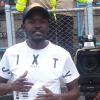
Opposition supporters protest outside a court in Harare, Zimbabwe,, June 27. The protesters were angered by a magistrate's decision to deny bail to close to 80 activists arrested mid-June for allegedly meeting without official clearance. (AP/Aaron Ufumeli)
Catholic bishops in Zimbabwe and Nigeria are urging governments to listen to demands of activists and protesters instead of cracking down on protesters through the use of force.
This comes as antigovernment protests engulf more African countries that are battling rising inflation worsened by poor agriculture seasons that have driven populations into food insecurity. Climate-change-induced droughts, especially in sub-Saharan Africa, have also decimated sources of income while low commodity prices are affecting a major source of income for informal miners.
In Zimbabwe, Catholic bishops have criticized the government for arrests, detentions and torture of civic and opposition activists ahead of the Aug. 17 meeting of regional African leaders in Harare, saying the heavy-handedness by President Emmerson Mnangagwa's administration violated human rights.
Zimbabwe hosted a summit of heads of state from the Southern African Development Community (SADC) while Mnangagwa assumed the rotational chairmanship of the regional bloc. Civic, opposition and democracy campaigners sought to use the gathering of the regional heads of state to voice out against the Mnangagwa administration's alleged rights abuses and Harare's crackdown on those who dissent against the Zimbabwe leader.
Mnangagwa took over from the late former ruler Robert Mugabe after a coup in 2017, subsequently winning disputed elections in 2018 and 2023. About 100 activists protesting against Mnangagwa's administration had been arrested, jailed and denied bail in the lead up to the Aug. 17 Southern African Development Community meeting in Harare amid allegations of torture in custody.
The Zimbabwean bishops said the officials' actions were doing "no one any good" and were also an infringement on human rights.
Analysts said Mnangagwa's administration used the crackdown on the activists to quell potential protests and uprisings against his administration during the Southern African Development Community summit.

Zimbabwean President Emmerson Mnangagwa, center, inspects an honor guard from a military truck during Zimbabwe Defence Forces Day commemorations at Rufaro Stadium in Harare Aug. 13. (AP/Aaron Ufumeli)
"As the Catholic Bishops we are worried and saddened that to silence the dissenting voices and to quell possible demonstrations, violence, torture, and abductions seem to be the only options deployed," the Zimbabwe Catholic Bishops' Conference said in a statement. "Why not try dialogue with those who feel aggrieved by the present state of our country?"
The bishops added that they had noted "the wanton arrests of citizens under frivolous charges" and that those arrested were denied bail. "Let us safeguard the human rights enshrined in our Constitution," the bishops added.
Political analysts have also criticized Mnangagwa's administration for cracking down on civic and opposition activists.
Stephen Chan, professor of world politics for the School of Oriental and African Studies at the University of London, said in an interview that before the Aug. 17 regional meeting of heads of state, Mnangagwa had "overplayed [the government's] hand with the detention of supposed opposition activists — many of whom have done precisely nothing" to warrant the arrests.
After Mnangagwa appeared to blame Western nations, especially Britain and the United States, for allegedly funding the protesters, Chan said: "Rather than appear to the visiting SADC presidents as a leader who is paranoid, he has to invent a nonexistent threat. Not a single foreign power is attacking Zimbabwe, the U.S. is busy preparing for elections and dealing with the escalating Middle East crisis, and the U.K. is in the midst of building post-election policy."
Opposition political parties in South Africa have been pushing for the summit to be moved away from Harare due to the arrest of opposition and civic rights activists, although the South African government refused to demand such a move. The Zimbabwe Lawyers for Human Rights said one of the opposition and civic activists detained in Harare had been tortured while in custody.
Zimbabwean opposition activist Fadzayi Mahere welcomed the statement by the country's Catholic bishops. She said the Catholic Church in Zimbabwe has long been "fearless in its ability to speak truth to power and stand up" for what is right.
Advertisement
Mahere added that the bishops had spoken out "against the deteriorating human rights situation including abductions, torture, flimsy arrests and the unconstitutional weaponization of the legal system" against citizens.
Other African countries have been battling antigovernment protests. In Malawi, protesters demonstrated early this month over reported irregularities in the National Registration Bureau's distribution of identification documents and against the Malawi Electoral Commission's stringent voter identification requirements ahead of next year's election.
Kenyan President William Ruto had to withdraw the introduction of new taxes after young citizens in the country demonstrated against the new finance measures, which they said fueled the government's excess spending at the expense of a development agenda.
There have been protests further afield in Africa, with Nigerian demonstrators taking to the streets in a rare movement that united people from across religious divides to voice their concerns about the rising costs of food and transport.
Christian groupings in Nigeria such as the Anglican and Catholic Churches have said that although the antigovernment protests in the West African nation have fizzled out, they were sparked by hunger. The Catholic bishops of Nigeria have urged the government of President Bola Tinubu to review economic policies in the country.
"The president of any country ought to be a listening and compassionate leader. I don't want to talk about the hunger protest in detail but we cannot continue to keep quiet," Owerri Archbishop Lucius Iwejuru Ugorji, president of the Catholic Bishops Conference of Nigeria, said during an Aug. 3 ceremony for the ordination of 11 priests at Maria Assumpta Cathedral in Owerri.








